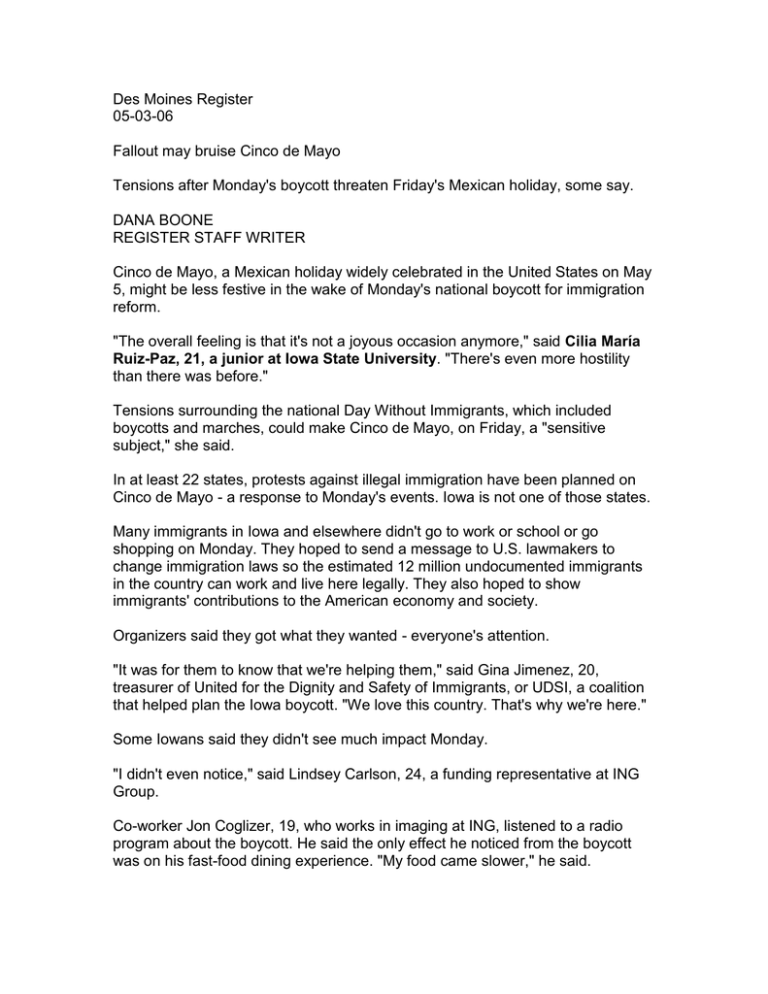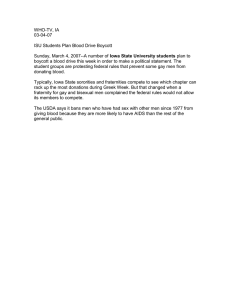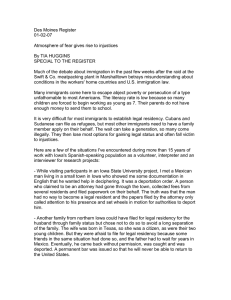Des Moines Register 05-03-06 Fallout may bruise Cinco de Mayo
advertisement

Des Moines Register 05-03-06 Fallout may bruise Cinco de Mayo Tensions after Monday's boycott threaten Friday's Mexican holiday, some say. DANA BOONE REGISTER STAFF WRITER Cinco de Mayo, a Mexican holiday widely celebrated in the United States on May 5, might be less festive in the wake of Monday's national boycott for immigration reform. "The overall feeling is that it's not a joyous occasion anymore," said Cilia María Ruiz-Paz, 21, a junior at Iowa State University. "There's even more hostility than there was before." Tensions surrounding the national Day Without Immigrants, which included boycotts and marches, could make Cinco de Mayo, on Friday, a "sensitive subject," she said. In at least 22 states, protests against illegal immigration have been planned on Cinco de Mayo - a response to Monday's events. Iowa is not one of those states. Many immigrants in Iowa and elsewhere didn't go to work or school or go shopping on Monday. They hoped to send a message to U.S. lawmakers to change immigration laws so the estimated 12 million undocumented immigrants in the country can work and live here legally. They also hoped to show immigrants' contributions to the American economy and society. Organizers said they got what they wanted - everyone's attention. "It was for them to know that we're helping them," said Gina Jimenez, 20, treasurer of United for the Dignity and Safety of Immigrants, or UDSI, a coalition that helped plan the Iowa boycott. "We love this country. That's why we're here." Some Iowans said they didn't see much impact Monday. "I didn't even notice," said Lindsey Carlson, 24, a funding representative at ING Group. Co-worker Jon Coglizer, 19, who works in imaging at ING, listened to a radio program about the boycott. He said the only effect he noticed from the boycott was on his fast-food dining experience. "My food came slower," he said. Organizers will spend the coming weeks assessing the economic and social impact of the boycott. Participating in the boycott has cost some immigrants their jobs, some say. Jimenez said six hotel workers who were absent from work on Monday were fired on Tuesday. Alex Orozco, an organizer with UDSI, said he heard from a cleaning company worker who was fired. "They ended up retaliating against them for something they should have been supportive of because it affects them as well," he said. Organizers are compiling lists of businesses that fired workers and that either supported or didn't support the effort, Orozco said. The list of firings will be sent to national immigration groups that are tracking the issue. More than 40 businesses closed in the Des Moines area on Monday. Dozens of other businesses across the state, including meatpacking plants, also closed, which surpassed organizers' expectations, Jimenez said. The boycott accomplished its mission of helping Americans understand the concerns of undocumented immigrants, said Jimenez, who was born in Campeche, Mexico, and moved to Iowa in 2000. "It was just one day," she said. "They need to understand we're not doing anything bad. That's the way that we have to speak out. We don't have other options." The planned anti-immigration protests do not surprise them, organizers said. A growing number of Web sites list anti-illegal immigration protests, including www.illegalimmigrantprotest.com and http://citizensonstrike.us, which is toutingFriday and June 30 as days to show U.S. lawmakers the impact a citizen boycott could exert on society and the economy. "Attacking certain immigrant communities by either naming them personally or deciding not to patronize those businesses is not going to fix the current federal immigration system," said Flavia Jimenez, an immigration policy analyst at the National Council of La Raza, an activist group based in Washington, D.C. "It's going to further divide the community." U.S. Census projections estimate Iowa's Latino population will more than double, from 104,199 to 269,630, by 2030. Estimates show about 50,000 to 75,000 of the Latinos are in the state illegally. Normally, Ruiz-Paz, the ISU junior who was born in Barranquilla, Colombia, would have heard about Cinco de Mayo festivities by now, but "this year it hasn't even been talked about," she said. Ruiz-Paz, who is president of ISU's Latino Heritage Month, said students were too busy planning their participation in Monday's boycott. Cinco de Mayo celebrates the Battle of Puebla on May 5, 1862. Although the battle was won, the French returned with additional troops and ruled over Mexico for five more years before Mexico expelled them. Orozco said the protests, vigils and events happening across the country will continue to spark debate, which he hopes in the end will help immigrants. "From what I've seen so far, we were able to accommodate what we set out to do," he said. "We got our message out."





